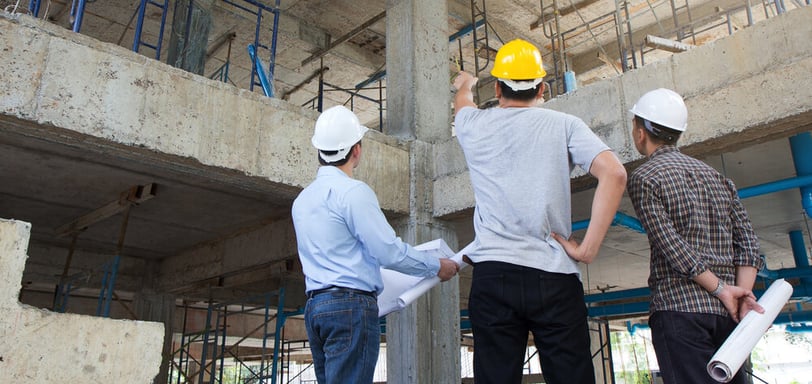Why should general contractors call structural engineers?
3 min read


General contractors should call structural engineers for several reasons related to ensuring the safety, integrity, and compliance of the project they are working on. Here are the key reasons why a general contractor might need to call a structural engineer:
1. Structural Design and Load Calculations
Why: Contractors are often responsible for executing the design of a project, but they may not have the expertise to design load-bearing systems like foundations, beams, columns, or roof trusses. These elements require specialized knowledge to ensure they are appropriately sized and capable of handling the loads they will bear.
Action: A structural engineer can provide:
Detailed design and load calculations for structural elements to ensure they meet building codes and can safely support the loads.
Advice on materials and construction methods to ensure structural strength and durability.
2. Evaluating Site Conditions and Soil Reports
Why: Before starting construction, a general contractor needs to know the condition of the ground, especially for the foundation of the building. Site conditions can vary, and factors like soil type, moisture levels, or earthquakes can affect foundation design.
Action: A structural engineer will:
Review and interpret soil reports and geotechnical studies to determine the appropriate type of foundation for the building.
Assess the site conditions and provide recommendations on foundation design, including depth, reinforcement, and settlement concerns.
3. Addressing Structural Modifications
Why: During construction, general contractors may encounter situations where changes or modifications to the original design are required, such as removing walls or altering structural elements. These changes can affect the overall integrity of the building.
Action: A structural engineer will:
Assess the impact of the proposed changes and ensure that structural integrity is maintained after modifications (e.g., when removing a load-bearing wall, column, or beam).
Provide recommendations or redesigns to accommodate structural changes safely.
4. Ensuring Compliance with Building Codes
Why: General contractors must comply with local building codes and zoning laws, which ensure that the construction is safe and follows national or regional standards. Structural engineers are essential in ensuring that structural designs meet all necessary requirements.
Action: A structural engineer will:
Ensure that the design and construction comply with local building codes and regulations related to structural safety, materials, and construction methods.
Certify that load-bearing systems, foundations, and other critical components are built to code and are safe for occupancy.
5. Assessing and Repairing Existing Structures
Why: If the contractor is working on a renovation or an addition to an existing building, they may encounter structural issues or need to reinforce the current structure to support the new work.
Action: A structural engineer will:
Evaluate the existing structure to determine if it can support the proposed changes, such as a new addition, roof, or floor system.
Recommend reinforcement or repairs to ensure the existing structure can support additional loads or changes.
6. Troubleshooting Construction Issues
Why: During construction, unforeseen issues can arise that might affect the structural stability of the building. General contractors may encounter problems like unexpected shifts in foundations, settlement, or issues with building materials.
Action: A structural engineer can:
Provide solutions for resolving construction issues, such as foundation settlement, cracks, or structural deficiencies that occur during or after construction.
Offer guidance on how to correct mistakes or adapt the design to meet structural safety standards.
7. Inspecting and Certifying Completed Work
Why: After construction is completed, general contractors often need an expert to ensure the work meets structural safety standards. This is especially true for the final inspection or to provide a certificate of occupancy.
Action: A structural engineer can:
Perform a final inspection to verify that the construction complies with the approved plans and structural codes.
Provide certification that the building is safe for occupancy and meets structural integrity requirements.
8. Assisting with Insurance and Liability Concerns
Why: Structural issues or concerns that arise during construction may trigger insurance claims or disputes. Contractors may need to call a structural engineer to mitigate risks and resolve disputes related to structural issues.
Action: A structural engineer can:
Provide expert opinions to resolve disputes regarding construction defects, such as structural failure, poor design, or damage caused during construction.
Help contractors with insurance claims by assessing damage or potential liabilities related to structural components.
9. Enhancing Design Efficiency
Why: Contractors may work with architects and other design professionals to ensure that the project is not only safe but also cost-effective. A structural engineer can help optimize the design to reduce material costs while maintaining structural strength.
Action: A structural engineer can:
Suggest alternative materials or construction methods that reduce costs without compromising structural integrity.
Recommend design modifications that make the construction process more efficient, such as using prefabricated components or reinforcing certain structural elements.
10. Managing Complex Projects
Why: Large-scale or complex projects, such as multi-story buildings, bridges, or structures with unique designs, often require expert input at various stages of construction to ensure the project is executed correctly and safely.
Action: For complex projects, a structural engineer can:
Collaborate with the general contractor throughout the construction process, providing ongoing guidance and problem-solving for structural challenges.
Offer project management support for aspects of construction involving heavy loads, complex framing, or specialized materials.
Contact Us
Get in touch with our team of professional engineers to discuss your project requirements or to request more information about our services.
(407) 901-0133
Contact Us
Address
Preeminent Solutions
P.O. Box 206, Sanford, FL, 32773
